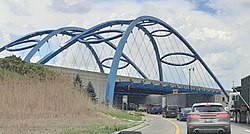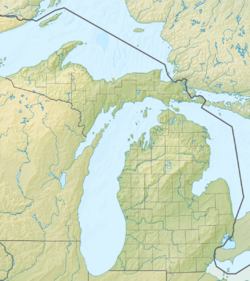Taylor, Michigan | |
|---|---|
| Nickname: | |
| Motto: "Omnis auctorias populo est" "Made For You" | |
 Interactive map of Taylor, Michigan | |
| Coordinates: 42°14′27″N83°16′11″W / 42.24083°N 83.26972°W | |
| Country | |
| State | |
| County | Wayne |
| Organized | 1847 (Taylor Township) |
| Incorporated | 1968 |
| Government | |
| • Type | Mayor–council |
| • Mayor | Tim Woolley |
| • Clerk | Cynthia Bower |
| Area | |
| 23.63 sq mi (61.21 km2) | |
| • Land | 23.62 sq mi (61.17 km2) |
| • Water | 0.019 sq mi (0.05 km2) |
| Elevation | 614 ft (187 m) |
| Population (2020) | |
| 63,409 | |
| • Density | 2,685.0/sq mi (1,036.67/km2) |
| • Metro | 4,285,832 (Metro Detroit) |
| Time zone | UTC−5 (Eastern (EST)) |
| • Summer (DST) | UTC−4 (EDT) |
| ZIP code(s) | 48180 |
| Area codes | 313 and 734 |
| FIPS code | 26-79000 |
| GNIS feature ID | 1614609 [4] |
| Website | cityoftaylor |
Taylor is a city in Wayne County in the U.S. state of Michigan. Its population was 63,409 at the 2020 census. [5] Taylor is the fifth most-populated city in Wayne County and the 17th most-populated city in Michigan.
Contents
- History
- Predecessor
- Township
- City formation and incorporation
- Recent history
- Geography
- Climate
- Main highways
- Neighboring communities
- Demographics
- 2010 census
- 2000 census
- Economy
- Education
- Notable people
- References
- External links
The area was originally a civil township known as Taylor Township, which was organized in 1848 and later incorporated as the city of Taylor in 1968. Taylor is the most-populated municipality of the Downriver community, and it is located about 5 miles (8.0 km) west of the southern border of Detroit and about 15 miles (24.1 km) southwest of Downtown Detroit.
Taylor is home to the Southland Center, Taylor Sportsplex, Beaumont Hospital – Taylor, the Downriver Campus of the Wayne County Community College District, and is the founding location of Hungry Howie's Pizza. The city was also home to the now-demolished Gibraltar Trade Center. Heritage Park is located within the city and hosts the Junior League World Series, which invites youth baseball players from all over the world for an annual tournament in August. The city is served by the Taylor School District.















